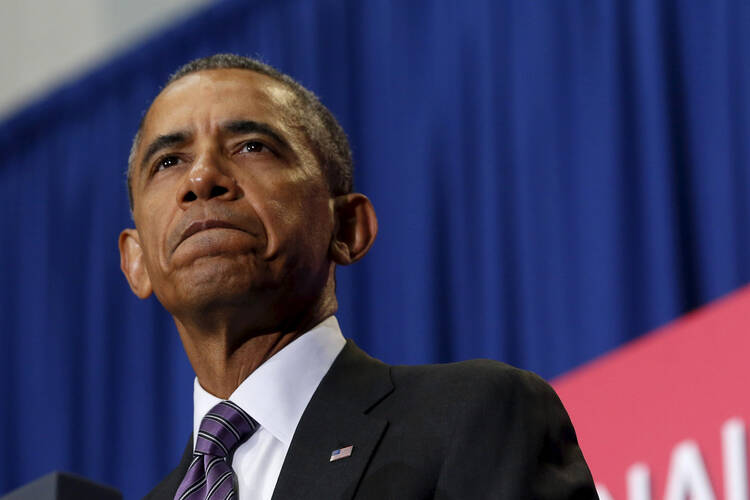“The country will not stand for it,” announced House Speaker Paul Ryan on Monday, referring to President Obama’s planned executive actions strengthening federal gun laws. “While we don’t yet know the details of the plan, the president is at minimum subverting the legislative branch, and potentially overturning its will,” Mr. Ryan said in a statement posted to his website. “This is a dangerous level of executive overreach.”
The time frame on the country not standing for it is unclear. Does Mr. Ryan mean that voters will punish Democrats in this fall’s elections, or does he mean something more immediate? Congress could conceivably undo the White House’s actions by, say, protecting the right of “occasional dealers” to sell firearms online or at gun shows without being licensed. Or perhaps Mr. Ryan is referring to “peaceful” demonstrations by Americans brandishing weapons in the 45 states with some kind of open-carry law. Is the takeover of a National Wildlife Refuge building in Oregon by a self-styled militia a trial run for free-floating-anger encampments elsewhere?
Mr. Ryan was mild compared with Chris Christie, the New Jersey governor and GOP presidential candidate who said on Sunday that Mr. Obama’s gun-control plans revealed him as a “petulant child” who wants to act like a “king” or “as if he is a dictator.” In a Fox News interview, Mr. Christie promised to protect the Second Amendment and boasted, “I’ve also pardoned six different folks so far who have been caught up very unfairly, in my view, in New Jersey’s gun laws.” Granting pardons is generally not something that Republican candidates brag about (Rand Paul has gotten nowhere talking about how America puts too many people in prison), but few things bring them to a boil as quickly as the idea of restrictions on gun ownership. Recall Carly Fiorina’s indignant opposition to keeping individuals on no-fly lists from purchasing firearms, based on the fact that her “best friend’s husband,” a gun owner, somehow ended up on a terrorism watch list for a few years.
Republicans have been seething for years about Mr. Obama’s use of executive action to bypass Congress in such areas as immigration, environmental regulations, net neutrality and implementation of the Affordable Care Act. Regardless of how a Republican would use the powers of the presidency, it’s clear that the party line for 2016 is to condemn the idea of the executive branch acting without the consent of Congress. This may explain what happened during Christmas week in Kentucky, when newly inaugurated Governor Matt Bevin, a Republican, rescinded executive orders by his Democratic predecessor that raised the minimum wage for state employees and restored voting rights to more than 100,000 ex-felons (a restoration that Americapraised last month). Mr. Bevin had said during last year’s gubernatorial campaign that he favored the restoration of voting rights and he voiced no initial objections to the executive order, but he now says, “it is an issue that must be addressed through the legislature and by the will of the people.”
There was another complaint of executive-branch overreach this week, from an unexpected source. New York Mayor Bill de Blaiso, a Democrat through and through, objected to the executive order by another Democrat, New York Governor Andrew Cuomo, that cities take homeless people to shelters when it freezes at night—using “involuntary placement” if necessary.
Mr. Cuomo cites “basic human decency” as the reason for his order, but the mayor’s press secretary was dubious about the process, saying, “We support the intent of the executive order, but to forcibly remove all homeless individuals in freezing weather, as the governor has ordered, will require him to pass state law.” A city attorney said that involuntary transfers to homeless shelters were permitted only when individuals posed threats to themselves or others.
But since this separation-of-powers tiff does not involve guns or immigration, the presidential candidates and national parties will probably step around it. It’s not likely to rank highly among voter concerns in Iowa or New Hampshire.








